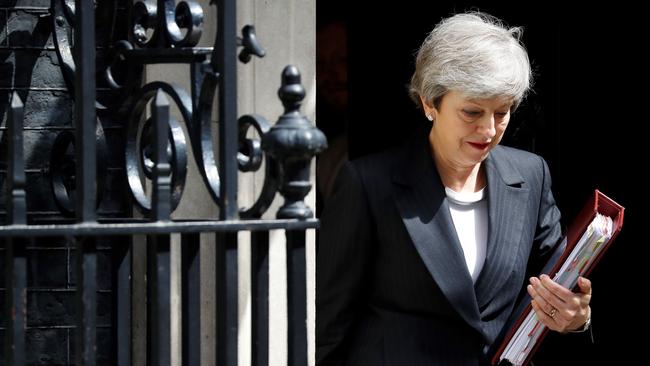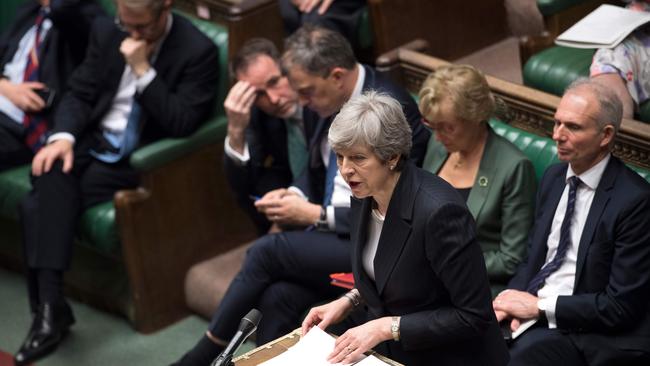Theresa May’s allies abandon her to her fate after she loses control
Theresa May gave a speech this week insisting it was “a great time to be alive”. It was her undoing.

Theresa May finally lost control of the Tory party on Tuesday afternoon just as she was giving a speech to a room of accountants insisting that it was “a great time to be alive”.
Within hours, the number of Tory opponents to her deal had doubled but an even more deadly backlash was under way among ministers who felt their leader had ignored the conclusion of Tuesday’s testy cabinet meeting.
Even those willing to let her go down with dignity were not willing to be bounced one more time. “I thought she deserved one last roll of the dice, but she took those dice and threw them off the table,” one cabinet minister said.
Mrs May gave her fourth and now final Brexit speech at the accountancy firm PwC on Tuesday afternoon.
Afterwards, Sajid Javid, the Home Secretary, was confronted by Tory MPs about the contents of the speech and its “unacceptable” promise to facilitate a possible path to a second referendum.
“Early evening I saw Sajid and wanted to know why there was talk by the PM of a second referendum,” one MP said. “He denied anything like that had been agreed so I ended up reading out the BBC website report of Theresa’s speech to him. He was speechless at what he heard.”
Later Mr Javid saw several Scottish Tories — hostile to a second referendum in case it legitimises a second independence referendum — for dinner as part of his leadership race. The same thing happened. “He was shocked as he hadn’t heard the PM’s speech and what we were saying she said didn’t match what he understood was agreed in cabinet,” one of those present said.
The MPs told Mr Javid that the cabinet should tell her to go. It was a pattern being repeated elsewhere.
By yesterday evening (AEST), even those who had defended her throughout her premiership were demanding that she announce her resignation this week.
A Brexit-supporting minister who has defended Mrs May on countless occasions said: “The most dispiriting thing is that she never learns from her mistakes. Her statement on Tuesday shows that.”

There was more anger than strategy in Westminster yesterday. Mrs May had already signalled she was likely to announce a timetable for her departure in the first week of June, after the expected defeat of the Withdrawal Agreement Bill. The question the Tory party began to grapple with yesterday was whether their rage was sufficient to justify forcing her to make an announcement about her departure from office a fortnight earlier than planned.
The answer for some appeared to be “yes”. One former cabinet minister said: “It’s not rational but people are very cross and immediate defenestration is what happens when they are cross.”
Many believed that Mrs May’s initial plan had been to stay until the party conference in October or even beyond. However, the events of this week had made that all but impossible.
Nigel Evans, a persistent critic of the prime minister, announced early yesterday that he would try to get the 1922 Committee of backbenchers to change the rules to hold an immediate vote of no confidence rather than having to wait until December.
However, at one stage it looked as though the cabinet might get there first. The so-called pizza club of cabinet Brexiteers met and their anger was palpable. A source said: “They wanted to know why the PM was introducing Brexit legislation that was going to go down to certain defeat. There were mixed views in the room about the PM herself: Liz Truss was the most forthright and made it clear she wanted her to go.” It broke up without a conclusion.
Mr Javid, David Mundell, the Scottish secretary, and Jeremy Hunt, the foreign secretary, demanded to see Mrs May to lay out their concerns.
By the afternoon, a small delegation had told Julian Smith, the chief whip, that after backing Mrs May’s deal three times, they could not vote for the Withdrawal Agreement Bill. By this stage it became clear that momentum was gathering. Mrs May refused to see Mr Javid, Mr Mundell or Mr Hunt.
While she was holed up in No 10, the only public face of the administration was Mr Smith, who was trying to avert the 1922 Committee’s executive changing the rules. He got his way, but not until Mrs May had given a commitment that she would see Sir Graham Brady, the chairman, tomorrow, with many expecting her then finally to announce her departure. Even this was not enough for some. Nadine Dorries, a consistent opponent of Mrs May, said she had been let off with “kicking the can down the road again”.
When it came, Andrea Leadsom’s resignation was almost a sideshow, paving the way for her likely leadership bid.
“Always on a Wednesday,” muttered a Tory veteran as he sauntered from the meeting of the 1922 Committee, a reference to the departures of Iain Duncan Smith and Margaret Thatcher.
The Times


